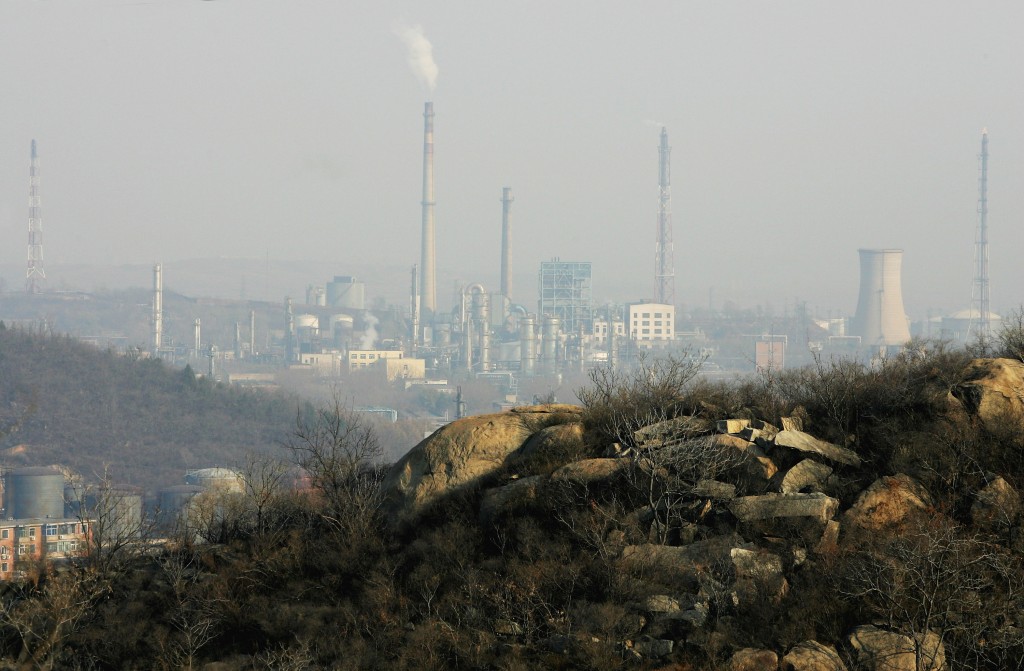
Smoke rises from the Yanshan Petrochemical Company on November 20, 2007 in Beijing, China. (Photo by Guang Niu/Getty Images)
A state-owned Chinese oil major has been caught violating provincial and local environmental laws. The size of the fine incurred however, points to evidence that these mega energy companies still have more sway within the country than local laws and government officials tasked to enforce those laws.
Late last week, Chinese media reported that Lanzhou Petrochemical Co., a subsidiary of China National Petroleum Corp. (CNPC), agreed to pay the Lanzhou government 100 million yuan ($16 million) over incidents that polluted air and water in the city. Lanzhou is the capital and largest city in Gansu Province in northwest China. The imposed fines come just two months ago after what local media called a scathing attack by the city’s environmental protection bureau accusing Lanzhou Petrochemical of “fouling the community’s air and water several times last year.”
Despite voicing displeasure with the oil company’s actions, it appears that local officials have little power other than complaining and issuing nominal fines. Moreover, city officials have wanted to move the plant to an industrial park about 38 kilometers (24 miles) from the city center since 2011, but so far their efforts have been muted. One problem is the cost of relocating the plant, estimated at 60 billion yuan – a sum that the city can’t afford and CNPC is unwilling to play.
Though the situation unfolding in Lanzhou is small in scale, it points to two growing problems within China: wide-scale environmental degradation and the inability of officials to rein in offending companies. Reports have claimed for several years that local officials are intimidated by the larger national oil companies which wield more political clout and economic muscle, while officials are reluctant to issue fines for fear that they could lose the government revenue and local jobs these companies provide.
In addition, when fines are issued, companies often simply don’t comply, leaving local authorities with no power to enforce them. Added the fray is the fact that local officials are often under-trained, and under-staffed, while some are reportedly compensated for looking the other way instead of enforcing laws on the books. Officials are also underfunded. Shi Lei, an environmental economist, said that tackling China’s environmental problems effectively would require spending nearly twice as much as the country currently budgets.
This development is also set against the backdrop of the recently released “Under the Dome” documentary film, highlighting China’s energy and environmental problems. The film went viral pulling in over 150 million viewers on Youko, China’s version of You Tube, in just a few days after its release. Alvin Lin, China climate and energy policy director at environmental group the National Resources Defense Council told Breaking Energy a few days after the film’s release that it could tip the scales in favor of really strengthening environmental laws.
However, those hopes were dashed just a week later when the film was banned on order by the Communist Party’s central propaganda department. Once again, Beijing tried to head off public discourse over the most pressing issue facing the country.
The situation was supposed to improve after China’s controversial environmental protection law went into effect at the beginning of the year, strengthening the legislative tools to punish polluters, while making significant progress in public interest litigation. Chang Jiwen, a senior adviser at the State Council’s Development Research Center, said at the time that “if well implemented, the new law will make a huge difference.” However, it appears that China now has the laws in place, but still falls short on the implementation side of the equation.
